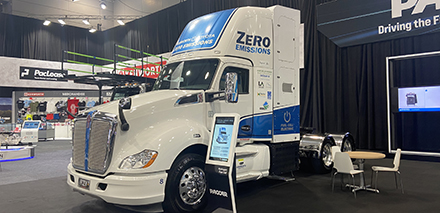A consistent national approach towards infrastructure is needed from the Federal Government if the trucking industry is to move away from fossil fuels, according to PACCAR Australia Product Program Manager Jonathan Crellin. Source: Timberbiz
“Diesel is going to be available for the foreseeable future, but there’s a push to get away from fossil fuels,” Mr Crellin said.
Mr Crellin said that there is currently a challenge with range and mass when it comes to battery-powered trucking.
“They’re probably the two biggest hurdles for them. Batteries are inherently heavy,” he said.
“Certainly, the energy density of diesel has a huge advantage because you can put enough diesel in a Kenworth B-double to drive from Melbourne to Brisbane without refuelling, and these are the applications that carry so much of Australia’s road freight.
“Log trucks as well. You can fill them with diesel, and they can go a long distance. But range on batteries is limited,” Mr Crellin said.
Victoria, New South Wales and South Australia’s state governments have made announcements allowing additional axle mass to enable heavier trucks because of the battery.
In Victoria an agreement has been reached with Volvo for some of its electric prime movers to operate on Department of Transport managed roads, but that doesn’t include all of the individual road managers such as local councils which manage their own roads.
“With current technology it is fair to say that for long haul applications, BEV trucks may not be the best option for these applications in Australia due to mass and range,” he said.
Mr Crellin said PACCAR believed that for long haul applications, hydrogen was probably the better option.
“But even then, until there’s adequate refuelling infrastructure it’s a no-go at the moment.
“The amount of hydrogen you need to replace all of the existing diesel trucks with hydrogen is massive.
“So there’s a long road ahead before there can be a real transition to it.”
Mr Crellin said PACCAR was “technology agnostic” on the whole issue.
“We’re not picking a winner. That’s why we’re working on a variety of different technologies,” he said.
“But I would say certainly in the Australian context that we see for heavy haul, heavy duty, interstate and intrastate applications that hydrogen is probably better.






